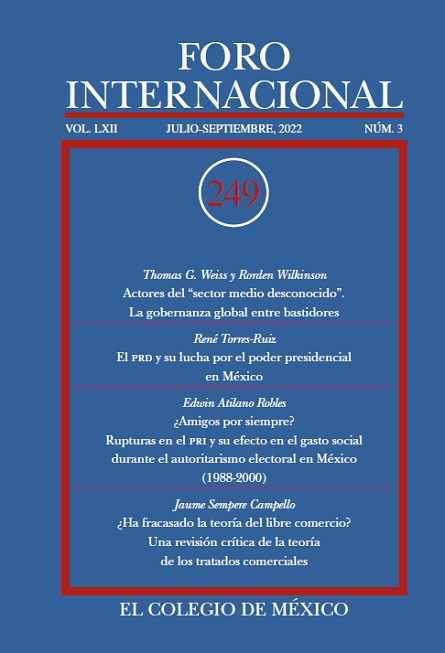Has free trade theory failed? A critical review of the theory of trade agreements
DOI:
https://doi.org/10.24201/fi.v62i3.2633Keywords:
free trade theories, customs unions, rules of origin, compensation, market failuresAbstract
One of the fundamental propositions of the theory of international trade is the hypothesis that free trade is profitable. This hypothesis underlay many of the trade liberalization movements that took place at the end of the twentieth century. After undertaking a critical review of the requirements for this free trade hypothesis to be valid, this article concludes that, in order to secure the expected gains of trade liberalization, it needs to be accompanied
by a very sophisticated public policy effort, one that is hard for governments to achieve. However, the policies of trade adjustment and correction of market failures can help to partially compensate those negatively affected by trade, and aid in realizing the efficiency gains it offers.
Downloads
References
BAICKER, K. y M. M. REHAVI, “Policy Watch: Trade Adjustment Assistance”, The Journal of Economic Perspectives, 18, 2004, pp. 239-255. DOI: https://doi.org/10.1257/0895330041371196
BARRETT, S., “Strategic environmental policy and international trade”, Journal of Public Economics 54, 1994, pp. 325-338. DOI: https://doi.org/10.1016/0047-2727(94)90039-6
BRANDER, J. y B. SPENCER, “Tariff protection and imperfect competition”, en H. Kierzkowski (ed.), Monopolistic Competition in International Trade, Oxford, University Press, 1984.
BRANDER, J. y B. SPENCER, “Trade adjustment assistance: Welfare and incentive effects of payments to displaced workers”, Journal of International Economics 36, 1994, pp. 239-261. DOI: https://doi.org/10.1016/0022-1996(94)90003-5
BURGUET, R. y J. SEMPERE, “Trade Liberalization, Environmental Policy and Welfare”, Journal of Environmental Economics and Management 46, 2003, pp. 25-37. DOI: https://doi.org/10.1016/S0095-0696(02)00032-3
CANTALA, D. y J. SEMPERE, “Algunas consideraciones sobre la integración de México en un Mercado internacional de emisiones”, Foro Internacional 209, 2012, pp. 695-711.
CHAMBERS, C. P. y T. HAYASHI, “Can everyone benefit from economic integration?”, Journal of Public Economic Theory, 22, 2022, pp. 821-833. DOI: https://doi.org/10.1111/jpet.12420
CONCONI, P., M. GARCÍA-SANTANA, L. PUCCIO y R. VENTURINI, “From Final Goods to Inputs: The Protectionist Effect of Rules of Origin”, American Economic Review, 108 (8), 2018, pp. 2335-2365. DOI: https://doi.org/10.1257/aer.20161151
COPELAND, B. y M. TAYLOR, “North-south trade and the environment”, Quarterly Journal of Economics, 1994, pp. 438 755-787. DOI: https://doi.org/10.2307/2118421
DIXIT, A. y V. NORMAN, “Gains from trade without lump-sum compensation”, Journal of International Economics 21, 1986, pp. 99-110. DOI: https://doi.org/10.1016/0022-1996(86)90007-3
FACCHINI, G., P. SILVA, y G. WILLMANN, “The political economy of preferential trade agreements: An empirical investigation”, The Economic Journal 131 (640), 2017, pp. 3207-3240. DOI: https://doi.org/10.1093/ej/ueab044
FEENSTRA, R. y T. LEWIS, “Trade adjustment assistance and Pareto gains from trade”, Journal of International Economics, 36, 1994, pp. 201-222. DOI: https://doi.org/10.1016/0022-1996(94)90001-9
GRANDMONT, J.M. y D. MCFADDEN, “A technical note on classical gains from trade” Journal of International Economics 2, 1972, pp. 109-125. DOI: https://doi.org/10.1016/0022-1996(72)90029-3
GRINOLS, E., “An extension of the Kemp-Wan theorem on the formation of customs unions” Journal of International Economics, 2, 1981, pp. 259-266. DOI: https://doi.org/10.1016/0022-1996(81)90020-9
GRINOLS, E. y P. SILVA, “Rules of Origin and Gains from Trade”, Economic Theory 47, 2011, pp. 159-173. DOI: https://doi.org/10.1007/s00199-010-0529-y
HAMMOND, P. y J. SEMPERE, “Limits to the Potential Gains from Economic Integration and other Supply-Side Policies”, Economic Journal, 105, 1995, pp. 1180-1204. DOI: https://doi.org/10.2307/2235411
HELPMAN, E. y P. KRUGMAN, Market Structure and Foreign Trade: Increasing Returns, Imperfect Competition, and the International Economy, Cambridge, MIT Press, 1985.
KEMP, M. C., “The gains from international trade”, Economic Journal 72, 1962, pp. 803-819. DOI: https://doi.org/10.2307/2228352
KEMP, M. C. y H. WAN, “The gains from free trade”, International Economic Review 13, 1972, pp. 509-522. DOI: https://doi.org/10.2307/2525840
KEMP, M. y H. WAN, “An elementary proposition concerning the formation of customs unions”, Journal of International Economics 6, 1976, pp. 95-97. DOI: https://doi.org/10.1016/0022-1996(76)90025-8
KENNEDY, P., “Equilibrium pollution taxes in open economies with imperfect competition”, Journal of Environmental Economics and Management 27, 1994, pp. 49-63. DOI: https://doi.org/10.1006/jeem.1994.1025
KRISHNA, K. y A. KRUEGER, Implementing free trade areas: Rules of origin and hidden protection”, NBER Working Papers 4983, National Bureau of Economic Research, Inc., 1995. DOI: https://doi.org/10.3386/w4983
NEWBERY, D. y J. STIGLITZ, “Pareto Inferior Trade”, The Review of Economic Studies, 51, 1984, pp. 1-12. DOI: https://doi.org/10.2307/2297701
PANAGARIYA, A. y P. KRISHNA, “On necessarily welfare-enhancing free trade areas”, Journal of International Economics 57, 2002, pp. 353-367. DOI: https://doi.org/10.1016/S0022-1996(01)00152-0
SAMUELSON, P., “The gains from international trade”, Canadian Journal of Economics 5, 1939, pp. 195-205. DOI: https://doi.org/10.2307/137133
SAMUELSON, P., “The gains from international trade once again”, Economic Journal 72, 1962, pp. 820-829. DOI: https://doi.org/10.2307/2228353
SEMPERE, J., “Condiciones para Obtener Ganancias Potenciales de la Liberalización de Comercio”, Cuadernos Económicos de I.C.E. 59, 1995.
ROSANVALLON, P., El Siglo del Populismo, Galaxia Gutemberg, 2020.
VANEK, J., General Equilibrium of International Discrimination: The Case of Customs Unions, Cambridge, Harvard University Press, 1965.













